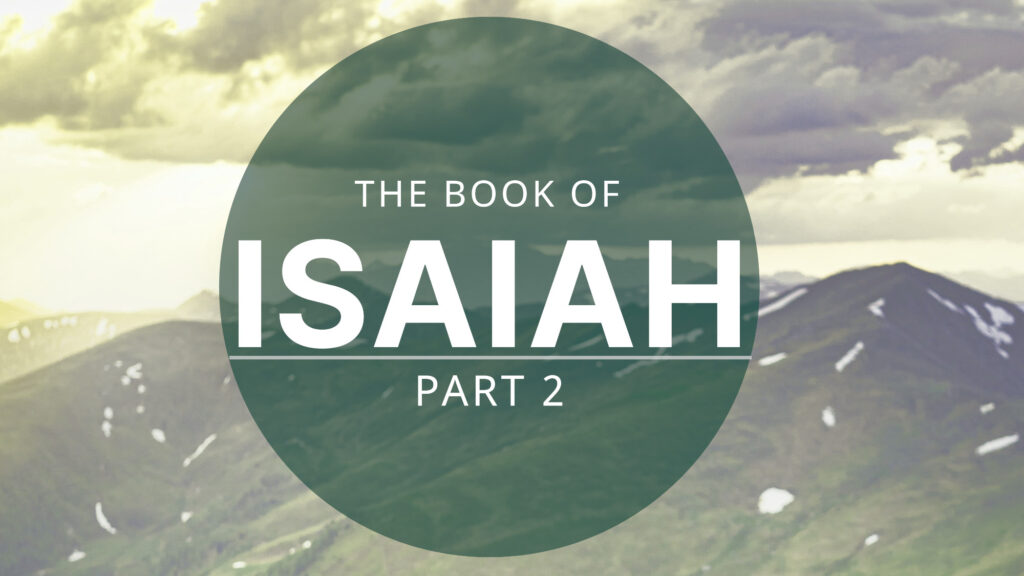Isaiah 42:1-9 “God Calls His Servant to Be A Light”
Listen to audio of Bible Study
42:1 God says he will “uphold” his servant. Discuss the possible interpretations for who might be referred to here as God’s servant. (Compare Is 41:8-9)
- The Lord calls many his “servants” including Abraham and Nebuchadnezzar. David and Moses were often designated by this title. God uses his “servants” to carry out his work in the world.
42:1 God says he will “uphold” this servant. Discuss the contrast with the idols (41:7).
- Idols need their maker to make sure they do not fall.
- God himself upholds his own servant. His strength is not from man, but divine.
42:1 There is a play on words using the word “spirit.” The same word is used in the previous verse 41:29. There it means “empty wind” or “empty spirit.” For further understanding of “my Spirit” see Acts 10:37, Luke 4:16-21.
- My Spirt is a reference to the Holy Spirit. The Father sent/placed the Spirit on Jesus during Jesus’ ministry on earth. Jesus was anointed by the Holy Spirit in his Baptism.
- John the Baptizer pointed to this event as sure evidence that Jesus is the Messiah. Isaiah 40 spoke about John the Baptist. Now Isaiah 42 speaks about the time John baptized Jesus and the Holy Spirit came down in visible form.
- As true God Jesus enjoyed perfect unity with the Spirit from eternity. But he lowered himself when he took on flesh and lived in our place. And at his baptism he began his preaching and teaching ministry. Then according to his human nature he was also anointed by the Holy Spirit, signifying Jesus as the Christ.
- Jesus humbled himself. And the Holy Spirit directed Jesus’ ministry and according to his human nature he was guided by the Spirit. (Luke 4:1)
42:2 Look at Matthew 12:16-17 and the surrounding context of Matthew’s gospel to see how the Servant did not cry out.
- Matthew mentions Jesus telling those healed to not tell others about it. He came humbly.
42:3 Determine who is “the bent reed and bruised wick.” Some translations render this to basically mean “he will not quench the smallest hope or hurt a smoldering and weak faith”. Others use it to enforce the idea that the servant will not falter in his mission or fail. Which does your Bible translation prefer? Explain why both interpretations fit Scripture’s picture of the Messiah. Compare with Isaiah 41:17 and 42:4.
- The Messiah was gentle and patient with those weak in faith and those losing hope.
- The Messiah himself was weak and lowly, yet as true God he could not fail to accomplish his work and complete his mission.
42:4 Use this verse to help define the term “Justice.” What are you looking forward to most about God bringing justice?
- It includes establishing a state of righteousness according to God’s standards.
- It is something that equated in this verse with “Torah” God’s law, his Word.
- It is something which the distant coastlands are hoping for, a good thing, it is the way things are supposed to be and what is truly good. It is what Jesus meant when he preached that the kingdom of God was near.
- It centers on the cross and the atonement of Christ: “In fact, there is no difference, 23because all have sinned and fall short of the glory of God 24and are justified freely by his grace through the redemption that is in Christ Jesus, 25whom God publicly displayed as the atonement seat through faith in his blood. God did this to demonstrate his justice, since, in his divine restraint, he had left the sins that were committed earlier unpunished. 26He did this to demonstrate his justice at the present time, so that he would be both just and the one who justifies the person who has faith in Jesus.” -Ro 3:22–26.
42:6-9 The voice changes here to address “you.” Who is being addressed?
- Compare with Is 48:8. The Servant, the Messiah, is the only one who perfectly fulfills all this.
- Could also be partially fulfilled as Israel carries the light of the gospel to the nations.
42:8 Who gets the credit and glory for all the work done by this “servant”?
God alone. The Lord himself had to be our redeemer! He alone gets the praise!
Review Isaiah 42:1-9
Read 42:1-9. “My Servant” can refer to 1) Israel as a whole or an individual Israelite 2) Cyrus or 3) the Christ. Identify at least seven notable things that make this servant stand out from all the others mentioned.
- This is not Cyrus but a believer God delights in and gives his Holy Spirit. And it is not Israel but the source of Israel’s blessings, the Lord himself.
- Verses 1-5 talk about the servant. 6-9 directly address him.
- God delights in him (recall the Words of the Father at Jesus’ baptism)
- He brings justice to all. Even the nations and the “islands” distant non-Jews will put their hope in him.
- He will give sight to the blind.
- He himself is the new covenant.
- He himself will be a light for the nations (Compare with Isaiah 9 and description of “Immanuel”)
- He received the Lord’s glory, not another. (Jesus, the Lord himself)
- Matthew 12:15–21 points to Jesus as the fulfillment of this prophecy.
You are part of the distant nations mentioned in this prophecy. How does seeing Christ as the fulfillment of this section give you comfort and hope?

Podcast: Play in new window | Download
Subscribe: Apple Podcasts | Spotify | Pandora | RSS
